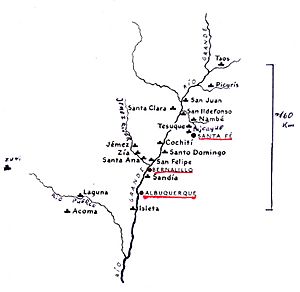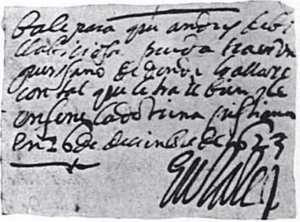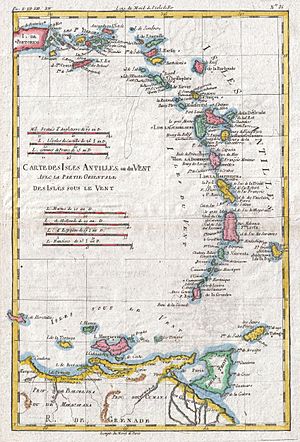Juan Álvarez de Eulate y Ladrón de Cegama facts for kids
Quick facts for kids
Juan de Eulate
|
|
|---|---|
| 4th Spanish Governor of New Mexico | |
| In office 1618–1625 |
|
| Preceded by | Bernardino de Ceballos |
| Succeeded by | Felipe de Sotelo Osorio |
| Governor of Margarita | |
| In office 1630–1638 |
|
| Preceded by | Garcia Álvarez de Figueroa |
| Succeeded by | Juan Luis de Camarena |
| Personal details | |
| Born | 1583 Eulate, Spain |
Juan de Eulate (also known as Juan de Ulate) was a Spanish soldier and governor. He was born in 1583 in Eulate, Navarre, Spain. He passed away on April 9, 1655, in the same region.
Eulate served as the Governor of New Mexico from 1618 to 1625. At that time, New Mexico was a province of New Spain. Later, he became the Governor of the Margarita Province (now part of Venezuela) from 1630 to 1638. After his time as governor, he returned to Spain.
Contents
Early Life and Military Service
Juan de Eulate was born in 1583. He was the second son of Juan Álvarez de Eulate and Juana Ladrón de Cegama y Alciturry. His family owned a large house in the small community of Eulate in the Kingdom of Navarre.
In 1602, Eulate traveled to Flanders (part of modern-day Belgium and the Netherlands). He joined the army of Albert VII, Archduke of Austria. He showed great bravery during the long Siege of Ostend, where he was wounded twice. He also served under Ambrogio Spinola, 1st Marquis of the Balbases in military trips into Friesland, again showing his courage. In 1608, he received a special certificate for his excellent service and returned to Spain.
From 1608 to 1617, Eulate was a captain in the Spanish fleet. He married María de Albizu y Díaz de Jáuregui. They had three children together. In 1617, he became an artillery captain and sailed to New Spain. In Mexico City, a high-ranking official called the Viceroy appointed him governor and captain general of New Mexico. He received a good salary and permission to use many Native Americans for labor under a system called encomienda. This system allowed Spanish settlers to demand labor or tribute from Native Americans.
Governor of New Mexico: Challenges and Changes
Eulate arrived in New Mexico in December 1618 with soldiers and priests. He found no government buildings in Santa Fe, so he built them himself.
During his time as governor, Eulate worked to bring peace to different Native American groups. He helped calm the Humanas, the Jemez, the Picuris, and the people of Zuni province. He also helped bring peace to the Acoma people. By the end of his time in office, New Mexico was more peaceful than before.
Eulate often disagreed with the Franciscan missionaries in New Mexico. The missionaries, led by Esteban de Perea, believed Eulate did not care enough about the rights of Native Americans. They said he allowed his friends to take orphaned Native American children as servants. These permits would say something like, "Permit for Juan Fulano to take one orphan from wherever he finds him, provided that he treats him well and teaches him the Christian catechism."
However, after Eulate left office, some Native American leaders said he had protected them. They said he defended them against common enemies and against too many demands for labor from the priests. Eulate himself complained that the missionaries' large building projects wasted the labor of Native Americans and colonists. He thought this labor could be better used for farming.
The arguments between the church and the government grew very strong. In 1620, the Viceroy in New Spain heard complaints and sent orders to both Perea and Eulate about how to treat Native Americans. In 1622, the Franciscans even thought about leaving New Mexico completely. They only stayed because of Perea's strong pleas.
Some missionaries said that Governor Eulate told the Pueblo Indians they did not have to give up their traditional religious practices. One missionary, Fray Pedro Zambrano Ortiz, said Eulate protected "idolators and witches because they trade him tanned skins." Zambrano also strongly criticized Eulate, saying he was not fit to be governor.
In December 1625, Admiral Felipe de Sotelo Osorio took over as governor from Eulate. Eulate returned to Mexico City in 1626. He was briefly arrested for using government wagons to carry his own goods and for bringing Native American slaves to sell. He was released after paying a fine.
While governor, Eulate also led two trips to capture buffalo. He wanted to use their meat, hides, and fat, which were better than Spanish cattle. The first trip only caught young buffalo, which did not survive. The second trip captured adult buffalo that lived. Eulate took some buffalo with him to New Spain, but he had to leave them near Mexico City because there was no room on the ships to take them back to Spain.
Governor of Margarita and Later Life
In 1630, Eulate was appointed governor of the Margarita Province. This province was based on Isla Margarita, an island off the coast of what is now Venezuela. He served in this role for eight years.
During his time as governor, he made the island's defenses stronger. He also helped improve trade and the pearl fishing industry. His forces actively fought against Dutch piracy around islands like Tortuga and Tobago.
In May 1633, Eulate's son, Julian de Eulate, led a small fleet from Margarita to nearby Trinidad. They captured English settlers and Native Americans who were part of a larger expedition.
In December 1636, Eulate provided Spanish soldiers to Captain Martin de Mendoza. Mendoza also gathered soldiers from other areas and many Native American allies. With this large force, Mendoza captured forts on Trinidad and Tobago in early 1637.
In 1638, Eulate's term as governor ended, and he returned to Spain. In 1640, he was recognized by the Kingdom of Navarre. He became a member of the Order of Santiago, a special Spanish order. He was also given the title of Maestre de Campo and became the castellan (commander) of Pamplona.
Historian France V. Scholes described Eulate as a strong-willed soldier. He often showed little respect for the Church and its leaders. He had a very high opinion of his own power as the king's representative. He was known for saying, "The king is my patron."
See also
 In Spanish: Juan Álvarez de Eulate para niños
In Spanish: Juan Álvarez de Eulate para niños
 | Madam C. J. Walker |
 | Janet Emerson Bashen |
 | Annie Turnbo Malone |
 | Maggie L. Walker |




